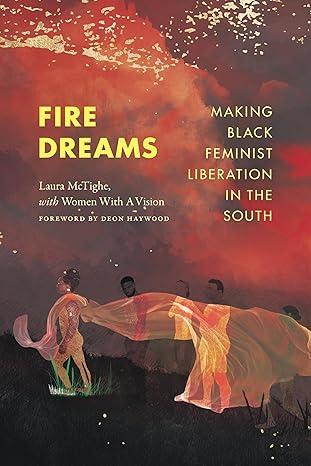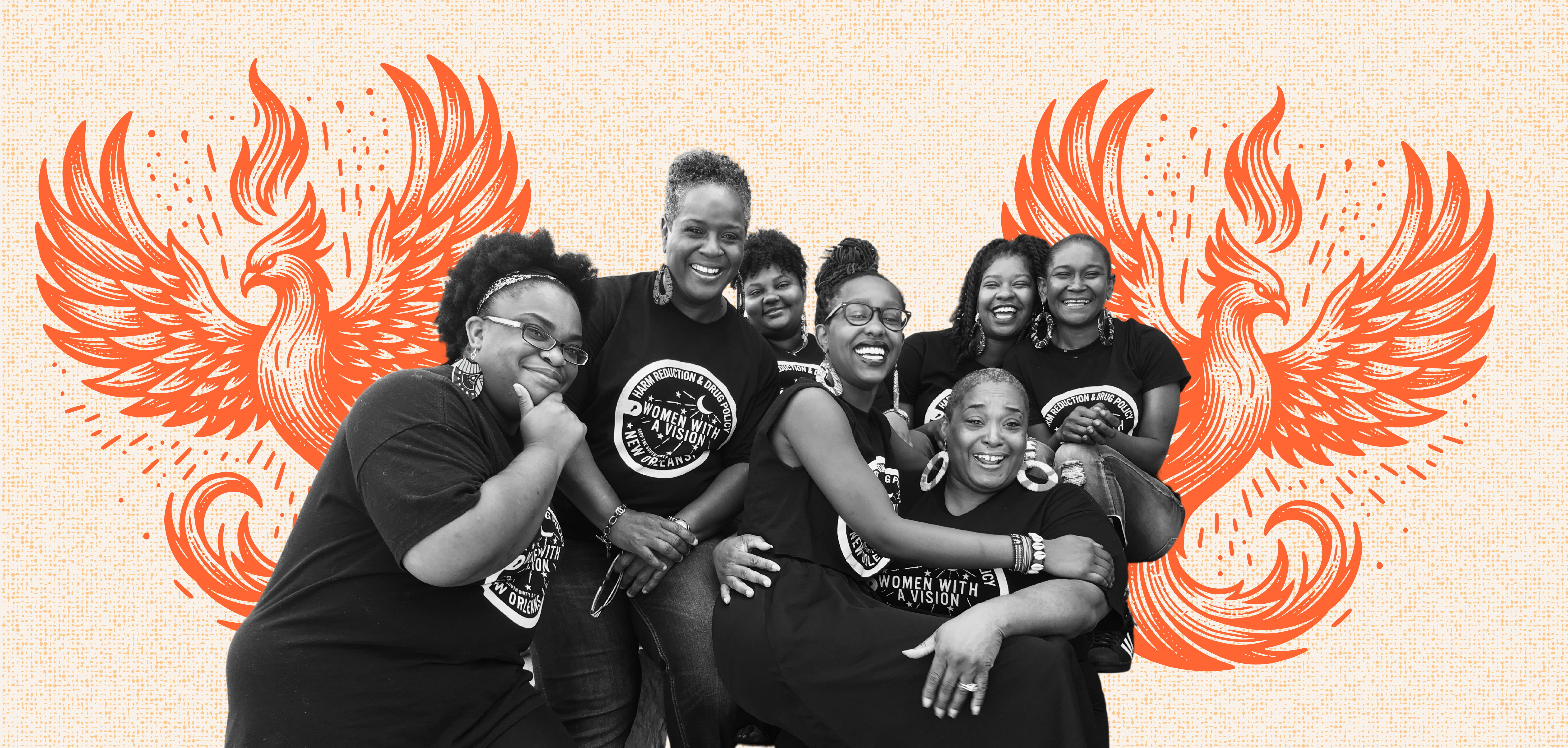Fire Dreams: Making Black Feminist Liberation in the South (Duke University Press, 2024) tells the story of New Orleans–based Women With A Vision (WWAV) and the collective’s Black feminist liberatory praxis rooted in the U.S. South.
Since 1989, WWAV has organized with Black women, queer and trans communities of color, sex workers, drug users, and people living with HIV/AIDS against the criminalization of their communities. In 2012, on the heels of a major organizing victory, arsonists attacked WWAV’s office, destroying their longtime organizing home and physical records of their work. That could have stopped WWAV’s work—but it didn’t.
In the fire’s wake, WWAV decided to document the organization’s rebuilding. That led to Fire Dreams, a collaborative ethnography of WWAV that presents a living archive[1] of the group’s work and a toolkit for movement organizers.
As fires blaze across the U.S. and the world, what can movement builders learn from WWAV’s relational organizing for health and reproductive justice, and their practice of “research as survival”?
To find out, PRA spoke with WWAV’s executive director Deon Haywood; Fire Dreams coauthor Laura McTighe, an associate professor of religion at Florida State University and longtime WWAV accomplice; and Ash-Lee Woodard Henderson—then co-executive director of the Highlander Research and Education Center, which was firebombed in 2019—about surviving White supremacist and state violence.

The following is a condensed excerpt from a forthcoming article based on the two-hour roundtable and has been significantly edited for length and clarity.
PRA: Could you tell us about WWAV’s intersectional work and how this book came out of it? Why was it important to you to tell this story of making Black queer feminist-led liberation from the South?
Deon Haywood: I’m going to read something we wrote a week ago on my whiteboard to set the stage: “WWAV was founded at the height of the HIV/AIDS crisis and the War on Drug Users. For 35 years, we have used the principles of harm reduction to care for our community. Today, it is no different. We are using tools like our Post-Roe Survival Guide[2] to ensure our community has the resources needed to survive regardless of lawmakers’ attacks.” I’m reading this as a reminder of where we come from and why we exist to this day.
The book came about because we were targeted. In 2012, I was getting multiple death threats on a weekly basis. I didn’t get that until we started looking at policy in post-Katrina Louisiana—how the criminal justice system was using our people as a pawn to get federal dollars, and making the connection to police violence, which we saw happening to so many sex workers, both cis and trans women. They experienced violence on an everyday basis and from police. Our lawmakers, with DOJ funding after Katrina, were saying, We’re gonna catch all of these violent offenders. They were targeting and picking on sex workers.
We spoke out and met with the DOJ to try to get a consent decree against the local police department here. We held community meetings with trans and cis women, and queer people who had experienced police violence. Sometimes it was standing room only.
Almost two months after we won the Crime Against Nature by Solicitation case [with a legal team who filed the case in partnership with WWAV, resulting in the removal of sex workers convicted under the law from a sex offender registry[3] – Ed.], we got a call about the arson attack at our office. We lost so much. Documents, WWAV’s history, our first bylaws, and unique, handwritten notes from our founding mothers [Catherine Haywood and Danita Muse]. The next day after the fire, our clients showed up to donate. They knew that people around the country were giving [and they wanted to help us rebuild]. That’s when we realized we were doing something special.
At the time, Laura was on the board. We decided we needed to capture this—to record the story of who we are and how we do this.
One of our community members said [that day], “We’re gonna rise like a phoenix.” Fire is destructive, but it can also be renewing. And in that moment, we decided that was just going to be how we captured and documented the work.
Laura McTighe: Everything WWAV does is rooted in relationships, which are the theory and method of change. Deon’s mom [Catherine Haywood] always says, “You have to build a relationship. When you have that, you can do anything. But if you don’t have that, you can’t do anything.”
Honestly, we weren’t trying to write a book. We were trying to ensure the next iteration of WWAV’s work. We’ve seen this with archives and libraries being destroyed as part of the genocide happening now in Gaza: When you want to destroy people’s future, you try to obliterate their past. That’s why WWAV’s space was attacked.
But we learned quickly that so much of what WWAV has done has been carried in relationships and in stories. Continuing to do this—sitting on the front porch, making harm reduction packets, talking to community—was the rebirth and renewal of WWAV’s work after the fire.
We knew we were living through something that most people didn’t survive, much less come out to be as strong, through Deon’s leadership and all the people that have carried this work forward. And that was a story we had to share. We were seeing fires like that multiply across our world, and people needed tools for how to get through this—not only intact, but with your principles guiding and opening a broader horizon for liberation.
Ash-Lee Henderson: Relationships are the capital that we’ve got in the absence of philanthropic dollars for the kind of lifesaving work that WWAV does.
It’s about survival. The work gets done because of those relationships. It shouldn’t be revolutionary, but it is. What makes relationships revolutionary is how WWAV develops relationships: interdependent, not codependent, relationship between a base-building organization that also does direct service and mutual aid and political education.
Because of the way that Deon leads, how her mother did before her, and how she’s training her family to lead in organizing and her staff to be in organizing. There’s trust between residents of New Orleans and WWAV, because they do what they said they’d do and people respond in kind by saying, when you need something, we got you. But right now, there are not enough folks who are doing the work like Deon Haywood and WWAV.
PRA: In Fire Dreams, WWAV theorizes the “racial capitalism playbook” operating in our daily lives—and how Black women’s existence and organizing presents a counter-playbook that refuses this playbook’s logic. What lessons does the book offer to movement organizers and strategists for building the world otherwise in the face of unrelenting systemic violence and the resurgent Right?
Laura McTighe: When Andrea Ritchie did a book talk for Practicing New Worlds, she talked about the long view of her organizing work and how she realized that if she wasn’t in her own imagination, she was going to be in someone else’s.[4] That’s why it matters to us to name how racial capitalism is working in our everyday lives, to call those steps “a playbook,” because that is how the folks who are trying to destroy us work, and what WWAV does—through front porch strategy and our tools—is an entirely different process of worldbuilding.
We distilled the racial capitalism playbook’s steps in the wake of the arson attack to make sense of and name what WWAV’s foremothers and people before them have been living. Racial capitalism works by isolating people from necessary services, blaming them for the strategies they use to survive, criminalizing them for their survival, destabilizing their communities, erasing people from space, and taking their land.
In the book, we also theorize how WWAV works and offer several tools to build otherwise: space, accompliceship, refusal, and speech. […These tools] aren’t cookie cutter molds, but if you move all the pieces in formation, they build something different.
Deon Haywood: About the refusal part: It was modeled for me. Most leaders don’t know that you have the power to refuse. In the book we talk about my mom and Danita giving money back to people.
I knew it was okay to refuse and that I was still going to win. Everybody thinks you need money to win, but every single revolutionary moment that has happened in this country took place without money.
Ash-Lee Henderson: Deon’s description of [refusal] is the answer to the question. For me, this book isn’t a counter to the right-wing agenda to impact folks with HIV/AIDS or some innovative new strategy. For the last 35 years, WWAV has been a proof of concept of what Black women have been doing for centuries to dispel what the right-wing White supremacist patriarchy has been trying to prove in response to the beloved community that we’ve been building.
Fire Dreams is not the counter play. It’s the play. The Right is doing the counter. This arson was an attempt to break the long-term win. They didn’t. Why would they have risked an arson charge if Women With A Vision was losing?
Endnotes
[1] Women with a Vision, Born in Flames Living Archive, https://www.borninflames.com/, for more about the “living archive” from which the book emerged.
[2] Women with a Vision, Your Survival Guide to a Post-Roe Louisiana, November 2022, https://wwav-no.org/wp-content/uploads/2022/11/Post-Roe-PDF.pdf.
[3] Center for Constitutional Rights, “Crimes Against Nature by Solicitation (CANS) Litigation,” accessed September 30, 2024, https://ccrjustice.org/home/what-we-do/our-cases/crimes-against-nature-solicitation-cans-litigation.
[4] Andrea Ritchie presents Practicing New Worlds, Red Emma’s, Baltimore, MD, October 28, 2023, event attended by speaker.

